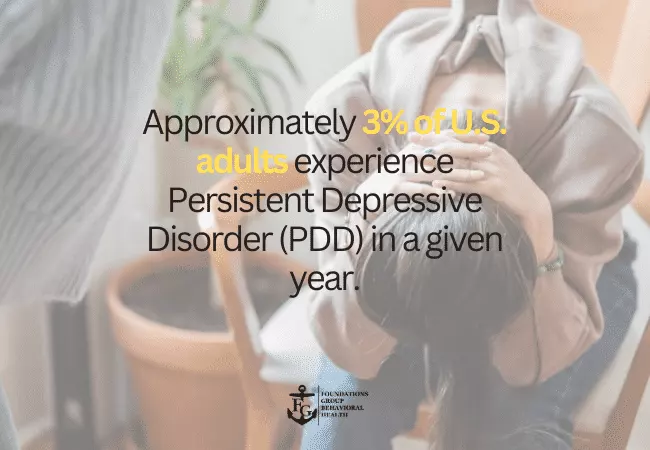High-functioning depression, often referred to as Persistent Depressive Disorder (PDD), is a mental health condition that combines the debilitating symptoms of depression with the outward appearance of normalcy. Individuals with high-functioning depression may hold steady jobs, maintain relationships, and fulfill daily responsibilities while silently battling feelings of hopelessness, exhaustion, and low self-worth. This hidden form of depression is often overlooked, leading to delayed treatment and worsening symptoms.
What Is High-Functioning Depression?
Unlike major depressive disorder (MDD), where symptoms are severe and disruptive, high-functioning depression presents as a chronic but less intense form of depression. It can persist for years, with symptoms often going unnoticed or dismissed as personality traits or a “bad mood.”
Core Symptoms of High-Functioning Depression
- Persistent Sadness: A continuous feeling of emptiness or hopelessness.
- Low Energy: Fatigue that affects motivation but doesn’t completely halt productivity.
- Reduced Enjoyment: Difficulty finding joy or fulfillment in activities, even those previously enjoyed.
- Irritability: Increased sensitivity to criticism or frustration.
- Self-Doubt: Chronic feelings of inadequacy or low self-esteem.
- Concentration Problems: Difficulty focusing or making decisions.
- Sleep Disturbances: Trouble falling asleep, staying asleep, or oversleeping.
How It Differs From Major Depression
- Duration: Symptoms persist for at least two years.
- Intensity: Symptoms are less severe but more chronic.
- Functionality: Individuals can maintain their daily responsibilities, masking the underlying struggle.
The Hidden Dangers of High-Functioning Depression
High-functioning depression is often underestimated due to its subtle nature, but it carries serious risks:
- Delayed Treatment
Because individuals can maintain a semblance of normalcy, they may not recognize their symptoms as depression or seek help until symptoms worsen. - Escalation to Major Depression
Without intervention, high-functioning depression can progress to major depressive episodes, increasing the risk of suicidal thoughts or actions. - Impact on Physical Health
Chronic stress and untreated depression contribute to physical issues such as heart disease, weakened immunity, and chronic pain. - Emotional Exhaustion and Burnout
The effort of hiding depressive symptoms and maintaining daily responsibilities often leads to emotional and physical burnout.
The Difference Between High-Functioning Depression and Stress
While high-functioning depression and stress can have overlapping symptoms, they are fundamentally different. Stress is a natural response to external pressures, such as work deadlines or personal responsibilities. It’s typically temporary and resolves once the external demands are managed. High-functioning depression, on the other hand, is a chronic mental health condition that affects an individual’s emotional well-being over the long term.
Key Differences:
- Duration: Stress is short-term and often situation-specific, while high-functioning depression lasts for at least two years.
- Cause: Stress is usually triggered by external events, while high-functioning depression may stem from a combination of genetic, biochemical, and environmental factors.
- Symptoms: High-functioning depression involves a persistent feeling of sadness or emptiness, while stress may lead to physical symptoms like headaches or tension.
- Impact: Stress typically improves with rest and resolution of the stressful situation, but high-functioning depression requires professional intervention to manage symptoms effectively.
How High-Functioning Depression Is Diagnosed
Diagnosing high-functioning depression requires a nuanced understanding of its symptoms. At Foundations Group Behavioral Health, we use a comprehensive diagnostic process to identify the condition and any co-occurring disorders.
Steps in Diagnosis
- Clinical Assessment
- A detailed evaluation of emotional, behavioral, and physical symptoms, including their duration and impact on daily life.
- Screening for Co-Occurring Disorders
- Many individuals with high-functioning depression also experience anxiety, trauma-related disorders, or substance use disorders. Integrated care through a Co-Occurring Disorder Treatment Program ensures all conditions are addressed.
- Personal and Family History
- Understanding a patient’s history of mental health challenges helps tailor treatment plans to their unique needs.
How to Recognize High-Functioning Depression in Yourself or Others
Identifying high-functioning depression can be challenging, as individuals with this condition often appear outwardly capable and successful. However, subtle signs can reveal the hidden struggle.
Signs to Watch For in Yourself:
- A persistent feeling of sadness or emptiness, even when everything seems fine.
- Low energy and constant fatigue despite adequate rest.
- Difficulty concentrating or making decisions.
- A lack of joy or fulfillment in activities you once enjoyed.
- Overcompensating with perfectionism or workaholism to mask emotional struggles.
Signs to Watch For in Others:
- Subtle withdrawal from social interactions or hobbies.
- Increased irritability or sensitivity to criticism.
- Frequently expressing self-doubt or negative self-talk.
- Changes in sleep patterns, such as sleeping too much or too little.
- Maintaining a busy schedule but exhibiting signs of emotional exhaustion.
Why Self-Diagnosis Is Risky
While it’s tempting to self-diagnose high-functioning depression based on online resources or personal research, this approach can lead to serious risks:
- Missed Underlying Conditions:
High-functioning depression may overlap with other conditions, such as anxiety, bipolar disorder, or trauma-related disorders. Only a trained mental health professional can accurately assess these complexities. - Inappropriate Treatment:
Self-diagnosis often leads to inappropriate or incomplete treatment. For example, focusing solely on self-help strategies without professional guidance may leave the root causes unaddressed. - Delaying Professional Help:
Believing you have “figured it out” on your own might delay seeking necessary treatment through a Mental Health Treatment Program or Psychiatric Day Treatment, prolonging suffering. - Reinforcing Stigma:
Mislabeling symptoms can reinforce the stigma surrounding mental health by trivializing the importance of proper diagnosis and care.

Myths About High-Functioning Depression
There are several myths about high-functioning depression that perpetuate misunderstandings and prevent individuals from seeking help. Addressing these misconceptions is key to reducing stigma and promoting awareness.
Myth #1: “If you’re functioning, you can’t be depressed.”
- Reality: Depression is not defined solely by an inability to function. Many people with high-functioning depression manage to meet daily obligations but struggle deeply on an emotional level.
Myth #2: “You just need to try harder or think positively.”
- Reality: High-functioning depression is not a lack of effort or a negative mindset. It’s a complex mental health condition that requires professional treatment to address.
Myth #3: “Therapy is only for severe depression.”
- Reality: Therapy is beneficial for all forms of depression, including high-functioning depression. Early intervention through programs like the Depressive Disorder Treatment Program can prevent symptoms from worsening.
Myth #4: “You can snap out of it with willpower.”
- Reality: High-functioning depression is not something individuals can overcome through sheer determination. It requires a combination of therapeutic support, lifestyle changes, and sometimes medication.
Myth #5: “If no one notices, it must not be that bad.”
- Reality: The ability to hide symptoms doesn’t diminish their impact. High-functioning depression is as serious as other mental health conditions and deserves the same level of care.
Treatment Options for High-Functioning Depression
At Foundations Group Behavioral Health, we offer a variety of evidence-based and holistic treatment options designed to meet each individual’s needs.
1. Psychiatric Day Treatment
This intensive program provides structured, full-day therapy sessions while allowing patients to return home in the evenings. It is ideal for those who need a higher level of care without hospitalization.
2. Half Day Treatment Programs
This program provides flexibility for individuals balancing work, family, or school commitments while addressing their mental health needs. Therapy sessions focus on skill-building and emotional regulation.
3. Outpatient Mental Health Programs
Outpatient care offers the least restrictive level of support, allowing individuals to maintain daily responsibilities while attending therapy sessions tailored to their recovery goals.
4. Individualized Therapy
- Cognitive Behavioral Therapy (CBT): Helps identify and reframe negative thought patterns that perpetuate depression.
- Mindfulness-Based Cognitive Therapy (MBCT): Combines mindfulness practices with CBT techniques to manage symptoms.
- Acceptance and Commitment Therapy (ACT): Encourages acceptance of difficult emotions while focusing on values-driven actions.
5. Medication Management
In cases where medication is necessary, our psychiatrists provide careful monitoring and adjustments to ensure optimal results.
6. Co-Occurring Disorder Treatment Program
For individuals dealing with anxiety, trauma, or substance use alongside depression, integrated care addresses all aspects of their mental health.
Coping Strategies for High-Functioning Depression
In addition to professional treatment, individuals can adopt practical strategies to manage symptoms:
- Build a Support System
- Share your struggles with trusted friends or family members. Isolation can worsen depressive symptoms.
- Prioritize Physical Health
- Regular exercise, a balanced diet, and adequate sleep can improve mood and energy levels.
- Practice Mindfulness
- Techniques such as meditation and deep breathing can help reduce stress and improve emotional regulation.
- Set Boundaries
- Avoid overcommitting and learn to say no to prevent burnout.
- Seek Joy in Small Moments
- Focus on simple, pleasurable activities that bring a sense of accomplishment or contentment.
- Stay Consistent with Therapy
- Regular therapy sessions provide the tools and support needed for long-term recovery.
Why Choose Foundations Group Behavioral Health?
At Foundations Group Behavioral Health, we are committed to helping individuals reclaim their lives from high-functioning depression. As a leading Behavioral Health Treatment Center in Massachusetts, we provide:
- Comprehensive Mental Health Treatment Programs designed to address both the symptoms and underlying causes of depression.
- Specialized programs like the Anxiety Treatment Program, Bipolar Disorder Treatment Program, and Trauma Disorder Treatment Program for co-occurring conditions.
- Compassionate, evidence-based care tailored to each individual’s unique needs.
Our multidisciplinary team of experts works closely with patients to create personalized treatment plans that promote healing, resilience, and long-term well-being.
Final Thoughts
High-functioning depression is a silent struggle that can have profound effects on mental, emotional, and physical health. While it may be difficult to recognize or seek help, treatment is essential to breaking free from its hold. With the right support, individuals can find relief, rediscover joy, and lead fulfilling lives.
If you or someone you love is experiencing symptoms of high-functioning depression, contact Foundations Group Behavioral Health today. Our compassionate team is here to guide you toward recovery and help you achieve a brighter, healthier future. Contact us today at 508.388.5324 to book your first session and begin your journey toward a more mindful future.
FAQ on High-Functioning Depression
How is high-functioning depression different from major depression?
High-functioning depression has less severe symptoms than major depressive disorder but lasts longer (at least two years). Unlike major depression, individuals with high-functioning depression can often maintain their daily responsibilities.
Can high-functioning depression get worse over time?
Yes, untreated high-functioning depression can escalate into major depressive episodes, increase the risk of co-occurring disorders, and negatively impact physical health.
What are the treatment options for high-functioning depression?
Effective treatments include therapy (such as CBT or MBCT), medication management, and structured programs like Psychiatric Day Treatment, Half Day Treatment Programs, and Outpatient Mental Health Programs.
How can I recognize high-functioning depression in myself or others?
Common signs include persistent sadness, low energy, difficulty enjoying life, self-doubt, and subtle withdrawal from social interactions.
Why is professional diagnosis important for high-functioning depression?
Professional diagnosis ensures accurate identification of symptoms and any co-occurring disorders, leading to a tailored treatment plan for effective recovery.








